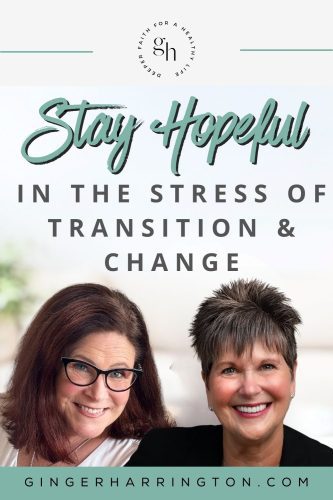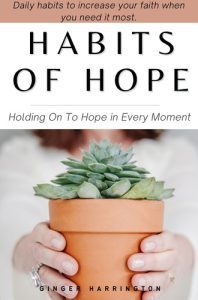Hope in transition starts here. Learn biblical habits for trusting God during change and staying grounded in faith when life feels overwhelming.
Hope in transition isn’t just possible—it’s essential.
When life changes fast—through grief, job loss, caregiving, or unexpected shifts—it’s easy to feel unsteady. But what if these very moments are where God wants to meet you? In this episode of Habits of Hope, we talk with author and speaker Peg Arnold about trusting God during change and learning to stay grounded in faith through small, steady habits.
Transitions can be exhausting. When your life feels like it’s spinning from one thing to the next—loss, distraction, pressure, or change—it’s easy to lose your footing. But what if the very place that feels most uncertain is where God is most present?

In our recent soul care series, we talked about building habits that sustain your heart. Today’s conversation brings that to life.
In this powerful episode, speaker, author, and devotional writer Peg Arnold shares about living with hope in seasons of grief, job loss, identity shift, and spiritual depletion—and how God met her in the middle of it all. You’ll hear practical encouragement, spiritual wisdom, and personal stories that reveal how hope can grow even when life feels messy, chaotic, and unpredictable.
Trusting God During Change: When Grief and Stress Collide
Just as Peg and her family were preparing to celebrate a season of milestones—her daughter’s college graduation and her son’s high school graduation—grief and loss showed up uninvited.
Her father, a longtime heart patient, had to cancel his trip for medical reasons. A week later, Peg’s husband received a call that his father had died suddenly of a heart attack. Then came a third call: he was being let go from his job, effective immediately.
“We were grieving, in shock, and trying to hold everything together,” Peg recalls. “I was planning a graduation while my husband flew across the country for his father’s funeral, and I just remember thinking—Lord, how much more?”

Finding Hope in Transition: How God Met Peg in Her Breaking Point
But in the middle of all that pain, Peg was surprised by a moment of joy.
Standing in the kitchen with her husband, she started singing:
“Bend me, break me—any way You want to, Lord. As long as You love me, it’s all right.”
“I don’t even know why it came out,” she said. “But it turned into a little dance in the kitchen. And in that moment, I felt it—God was still with us. That small burst of joy wasn’t from me—it was from Him.”
That moment in Peg’s kitchen didn’t change her circumstances—but it shifted her heart. It reminded her (and reminds us) that even in the stress of transition, God is present. He doesn’t wait for things to calm down to offer peace or hope. He meets us right where life feels the most uncertain.
From that season of upheaval, Peg gained powerful insight into how to walk through change without losing your footing. Here are the key truths and habits she shared to help you stay hopeful when everything feels like too much.
Habit of Hope
Make space for God’s strength by caring for your mind, body, and soul—even in small ways—when life feels uncertain.
In the stress of change, your needs matter.
Tending to your mental, physical, and spiritual health is not selfish—it’s how you stay connected to the God who carries you.
How to Stay Grounded in Faith Through Life’s Hardest Seasons
1. Understand God often works through distractions.
Distractions aren’t always interruptions—they can be invitations.
Peg shares a story about forgetting her phone while returning a rental car. The delay led her to a coffee line conversation that formed a lasting ministry connection. What felt like a mistake turned out to be a divine appointment.
Sometimes the detour is the direction—and God is waiting to meet you there.
Distractions can also protect us from something we can’t see or slow us down long enough to hear what we’ve been ignoring. When we stop labeling every interruption as bad, we begin to recognize the gentle fingerprints of God woven into ordinary moments.
2. Hold onto hope in transitions.
Change has a way of shaking everything that feels stable.
Peg describes a deeply painful season filled with overlapping losses: the sudden death of a family member, the loss of her husband’s job, and a series of emotional blows that made it feel like life had come undone. And yet, through every layer of transition, she experienced God’s faithfulness in surprising and personal ways.
“There’s always another challenge God is placing before us. It’s rarely just one storm—we walk through many.”
This episode reminds us that transitions don’t just rearrange our circumstances—they often confront our identity. Peg shares how God gently repurposed her calling after retirement, reminding her that her worth wasn’t in a title or a role, but in who she was in Christ.
3. Don’t overlook taking care of yourself.
To stay grounded in times of change, Peg encourages us to care for our whole selves. Here’s the simple framework she uses:
- Spiritual – Stay in the Word. The Bible is a vital resource for trusting God during change and transitions. Make time to nourish your soul and spirit.
- Mental – Take every thought captive. Transitions often bring uncertainty and spiraling thoughts. Ask God to help reframe your perspective with truth to turn your thoughts to hope.
- Social – Let others help. Don’t isolate. Even receiving a meal or a card can be a way God ministers through community.
- Physical – Pay attention to your body. Rest. Nourish yourself. Go for a walk. These physical habits help stabilize us when everything else feels shaky.

4. Turn Bible verses into prayers.
Peg shared how personalizing Scripture became a lifeline for her when traditional spiritual routines felt out of reach. Here are a few of the verses she turned into prayer—and how you can use them too:
- Psalm 23:1–3
“The Lord is my shepherd… He restores my soul.”
→ Prayer: Lord, You are my Shepherd. Restore my soul today. Lead me in Your peace even when I don’t know the path forward. - Proverbs 3:5–6
“Trust in the Lord with all your heart and lean not on your own understanding…”
→ Prayer: God, help me trust You fully and not rely on what I see or feel. I believe You are making a way even when I can’t see it. - Joshua 1:9
“Be strong and courageous… for the Lord your God will be with you wherever you go.”
→ Prayer: Lord, I feel weak—but You promise to be with me. Give me strength and courage for what’s ahead. - Matthew 11:28–29
“Come to me, all you who are weary and burdened, and I will give you rest.”
→ Prayer: Jesus, I’m tired and stretched thin. I come to You. Teach me how to rest in You today.
These verses aren’t formulas—they’re invitations to bring your real thoughts, emotions, and needs to God, even when you’re distracted, grieving, or unsure.
4. Create space in your day—and your heart—for margin.
Peg uses a powerful illustration of a domino chain to show how our lack of margin affects everything else in our lives.
When we stack our schedules with no room to breathe, even a small interruption can cause an emotional collapse. But if we build in space—margin for rest, flexibility, prayer, and reflection—our hearts become less reactive and more rooted in peace.
When we live life without margin, even the smallest interruption can feel like a collapse.
Margin allows us to respond with grace instead of react with panic. It gives us room to notice God’s presence, receive help, and make intentional choices. It’s one of the most overlooked tools of spiritual stability.
5. Pause before reacting—and choose a Spirit-led response.
Stress activates our brain’s fight, flight, freeze, or frustration response. Peg explains how easy it is to operate from that place—especially when we feel out of control or overwhelmed. But the habit of hope is learning to shift from reacting to responding.
That shift begins with a pause.
“Stop. Breathe. Pray one verse. Let that become the reset moment.”
Peg encourages us to ask: Is this the most important thing right now? Is this urgent or simply loud?
This small habit helps us invite the Holy Spirit into our next decision, conversation, or reaction—and keeps us grounded in faith rather than consumed by urgency.
Quotes to Remember:
“Distractions aren’t always disruptions—they can be divine appointments.”
“Sometimes He has to strip us down to rebuild us up. And that stripping down isn’t pleasant, but there’s purpose in it.”
“You may feel like your normal will never return—but God is still present in the new place you’re walking into.”
“When we live life without margin, even the smallest interruption can feel like a collapse.”
You don’t have to do everything at once. Choose one simple way to care for yourself today—mentally, physically, or spiritually—and invite God into that space.
What is one verse, habit, or relationship that God might be using to steady you in this season of change?
Want More on Soul Care and Spiritual Strength?
Before today’s episode, we shared a two-part series on soul care—what it is, why it matters, and how to make it part of your daily life. If you’re navigating a hard season, these episodes offer even more biblical wisdom and practical encouragement:
- 🎧 Why Soul Care Isn’t Selfish: How to Care for Your Soul Every Day
Discover why tending to your soul isn’t a luxury—it’s essential for spiritual strength. - 🎧Seven Ways to Make Time for Soul Care (Even When You’re Too Busy)
Learn how to recognize when your soul needs care—and what to do about it.
- Together with Peg’s story, these episodes form a powerful foundation for finding steady hope in any season.
- Download the free companion Soul Care Guide with 14 practices from the series to attend to your soul care today.
About Peg Arnold
 Peg Arnold is a speaker, author, and founder of Wonder Woman Ministries, known for bringing biblical truth to life through drama, storytelling, and devotional writing. With a background in education and counseling, Peg has a passion for encouraging women to embrace their God-given worth—right in the middle of life’s mess.
Peg Arnold is a speaker, author, and founder of Wonder Woman Ministries, known for bringing biblical truth to life through drama, storytelling, and devotional writing. With a background in education and counseling, Peg has a passion for encouraging women to embrace their God-given worth—right in the middle of life’s mess.
She’s the author of Devotions for the Distracted Heart and Making Your Message Memorable, a creative resource filled with over 90 ideas to help speakers and teachers use visual aids to bring biblical messages to life. Through her writing and speaking, Peg equips women to reconnect with God’s presence through scripture, humor, and hope—especially in seasons of change. (These are affiliate links at no cost to you).
📍Connect with Peg:
🌐 Website: PegArnold.org
📹 YouTube: Peg Arnold & Wonder Woman Ministries
📱 Instagram: @arnoldpeg



 So glad you're here. I help busy women—gals like you— build healthy habits for living well with biblical wisdom and practical steps to deepen your faith, increase your hope, and thrive in your purpose.
So glad you're here. I help busy women—gals like you— build healthy habits for living well with biblical wisdom and practical steps to deepen your faith, increase your hope, and thrive in your purpose.



